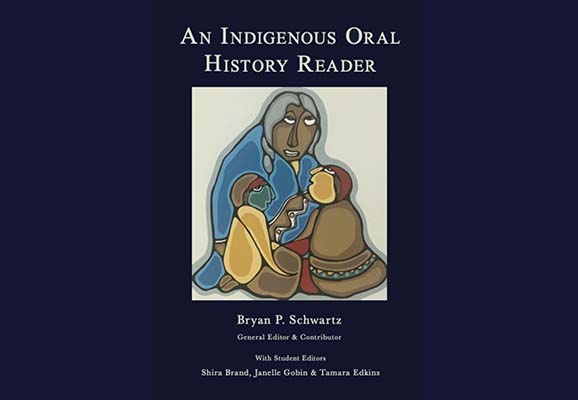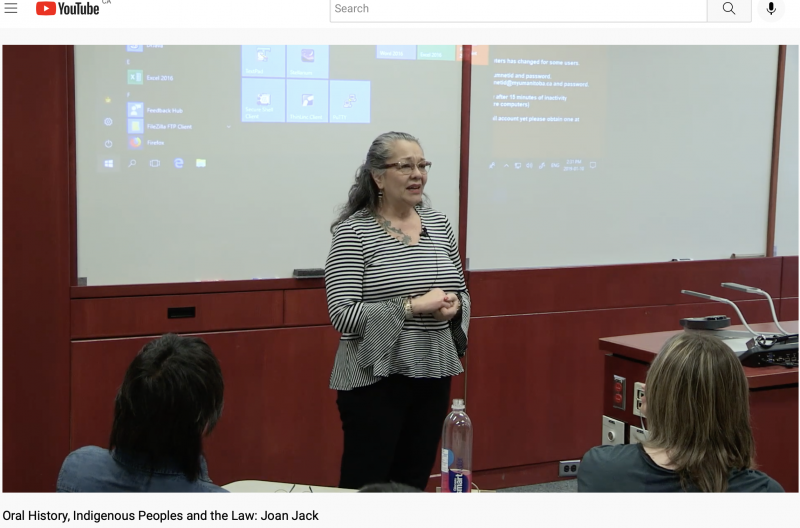
Cover art: “Grandfather Teaching” from the Homage to Grandfather series by Daphne Odjig, used with permission.
An Indigenous Oral History Reader moves law student training towards reconciliation
New publication a valuable resource supported by UM Indigenous Initiatives Fund
A course introducing law students to the oral history of Indigenous peoples in relation to legal systems has now been made a part of the permanent curriculum at Robson Hall. Materials used throughout the course have been compiled into a single volume and published as a comprehensive resource for the use of educators, scholars and students. An Indigenous Oral History Reader, edited by Dr. Bryan Schwartz, with assistance from several credited student editors was published March 18, 2022 and is available online through the University of Alberta Libraries and on a not-for-profit basis at amazon.ca.
“Indigenous Oral History is absolutely essential in order to understand the past and to help move forward towards reconciliation. It is culturally and spiritually important,” said Schwartz.
The University of Manitoba’s Dean of the Faculty of Law, Dr. Richard Jochelson said, “It is wonderful to see this resource made available and it will surely enrich the pedagogy of anyone who teaches in the area.”
Improving and contributing to the pedagogy of oral history was a hope of Schwartz’s when he first developed the course after receiving a grant from the University of Manitoba’s Indigenous Initiatives Fund. The course has now been delivered twice in-person and once online during COVID closures. Student feedback and ratings have been consistently positive, with remarks addressing the essential need for such a course to be a part of the law school curriculum.
“The course should be a mandatory requirement to graduate from law school because it is one of the few courses that goes to the heart of the issues Indigenous people had to overcome and continue to work for in terms of reconciliation,” a student noted in one review.
Other participants in the course were emphatic about the essential usefulness of the course to all law students. “This was a remarkable course – it was a very useful and necessary one,” said one student, who appreciated the practical implications and take-aways of learning about using oral history as witness testimony, and the importance of taking part in the course’s oral history workshop.
“Finding ways and protocols for Indigenous oral history to be presented and respected in Canadian common-law courts is essential for reconciliation efforts,” said Marc Kruse, Indigenous Student Support Coordinator for the Faculty of Law, and an expert in the Indigenization of post-secondary curricula. “The process of admitting oral evidence is a topic of importance for all law students on Turtle Island and this text is a primer to start these discussions.”
The text itself is the culmination of five to six years of work, hundreds of hours of reviewing books and articles, and studying oral history, Schwartz said. “Indigenization of the curriculum is a top priority for both the University of Manitoba and the law school,” he explained. “Oral history is absolutely essential to the development of the law concerning both the Canadian constitution and Indigenous peoples, and to the autonomous development of Indigenous legal systems by communities themselves.”
The Reader is organized in eight parts, each of which sets out a framework for learning about oral law and culture. Precedent-setting case law is intermingled with important research collected from various peer-reviewed journals explaining fundamentals about oral history as evidence and how it has been used in Canadian law. Historical and critical perspectives, anthropological and other forms of evidence are all examined, and a background in biblical, African and Homeric oral history and tradition are also set out. Finally, modern inquiries and initiatives including the inquiry into Missing and Murdered Indigenous Women and Girls and the National Centre for Truth and Reconciliation are explored.
While developing the course, Schwartz consulted extensively with Joan Jack, a practicing lawyer based in Berens River, and expert in cross-cultural training. Jack, who is Aanishinaabe Ikwe from Berens River First Nation, delivered the introductory lecture for the course during its inaugural year. She holds a Bachelor of Education degree from the University of Manitoba and a law degree from the University of British Columbia, and has continued to be a valuable partner in developing the course. A recording of Jack’s first lecture is available to view on the Faculty of Law’s YouTube channel.
Schwartz’ own prior practical experience with oral history includes appearing, on behalf of the Assembly of First Nations, in a number of cases at the Supreme Court of Canada involving oral history and also serving on behalf of the AFN on the federal-First Nations working group that helped produce the Specific Claims Tribunal Act. His latest work is the fifth book-length piece he has released as an academic (as either an author or editor) in the area of Indigenous legal studies in a career that has included over three hundred publications in all.
“Students who take the course obtain a solid background in not only Indigenous oral history, but the practice and ethics of oral history generally,” said Schwartz, explaining that participating students receive a certificate in an oral history workshop that is part of the course and delivered by Kimberly Moore, from the oral history program at the University of Winnipeg.
“Students who receive this overall education and training are better equipped to take other Indigenous courses, and to participate in the oral history projects that are a major facet of the Manitoba Law Journal,” said Schwartz, co-editor in chief of the MLJ, which also recently published a special volume on Indigenous Jurists and Policy-Makers from Manitoba: A Collection of Oral Histories (MLJ Vol. 41(2), 2018).
“Learning about Indigenous law and culture should be a dimension of our programming that is experienced widely and, in an environment where it is not seen as a niche learning area, but rather as an integral part of our overall program which all students see as a positive part of their growth,” said Schwartz.







